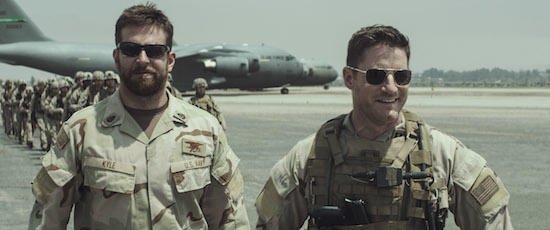
By Chris Marvin
Managing Director, Got Your 6
There's something unique about American Sniper. If this were just another modern war movie, Chris Kyle might be portrayed as a replica of the hollowed out versions of the soldiers we often see splashed across the big screen. Their faces smeared with sand and eyes void of emotion. Their only value derived from acts of courage during a heated battle scene. But this movie goes deeper and delivers an important lesson.
American Sniper -- directed by Clint Eastwood and opening in limited theaters on Dec. 25 -- is based on the true story of U.S. Navy SEAL Chris Kyle, portrayed impressively by Bradley Cooper. The film shares the story of a man who, even as a boy, saw himself as someone bound to protect those around him. Kyle lived by a simple code that drove his dedication to the men he served alongside, a sentiment that binds together many of us who have served. Kyle's infectious passion to accomplish a mission took him through four tours in Iraq and 160 confirmed kills, earning him the nickname "Legend."
Over the past decade, many, through cinema, have experienced the wars in Iraq and Afghanistan through explosions and gunfire. Yet, there is no realization of the lives that our service members and veterans live in between the battlefield and the home front. American Sniper takes the audience through the complexities of war and the families who have lived through it. There are noble struggles for hardened souls and the quest to find a sense of normalcy, which Eastwood and Cooper have found a way to accurately portray.
Kyle, with pinpoint precision, quells the threat of enemies hiding in alleys waiting to ambush American convoys. His dedication to the mission causes the sounds of war to echo at home as he contemplates the lives he could have saved. In the same manner, the responsibilities of life and family are ever present for him on the battlefield. It's through this journey that we see the depth of the man, once the uniform comes off. In the movie, a SEAL says, "You can't shoot what you can't see," yet somehow Eastwood has managed to capture the dichotomy of traveling home from the battlefield and back again like no director has before.
When Eastwood and Cooper move beyond the reputation of Kyle, we begin to understand the true value of a battle-tested veteran. As Kyle helps his fellow veterans cope with loss of limbs and reintegration challenges, he is able to exorcise his own demons. "Why do you do it?" a veteran asks Kyle as they shoot at a range. His response: "We take care of each other, right?"
I have spoken with many veterans who have screened American Sniper, and they all say the same thing: this movie gets it right. American Sniper is in a new breed of Hollywood war films. It is an inspiration for how to properly and thoughtfully showcase veterans and the reintegration process -- a model the entertainment industry should adopt more often.
American Sniper is also the quintessential example of the types of portrayals of veterans that Got Your 6 -- a coalition of 30 veteran-focused nonprofits -- is promoting in film and television as a way to demonstrate the nuance of the veteran experience. As Hollywood continues to tell the stories of those who have served, deployed, and returned home, depictions like these help bridge the civilian-military divide. American Sniper is the story of a man who ultimately succeeded on the battlefield and at home --and we all have responsibility to recount it.
Chris Marvin is a retired Army Black Hawk helicopter pilot, a veteran of the war in Afghanistan, and the managing director of the Got Your 6 campaign.
Follow Chris Marvin on Twitter: www.twitter.com/ChrisMMarvin
This article originally was originally published by The Huffington Post.




